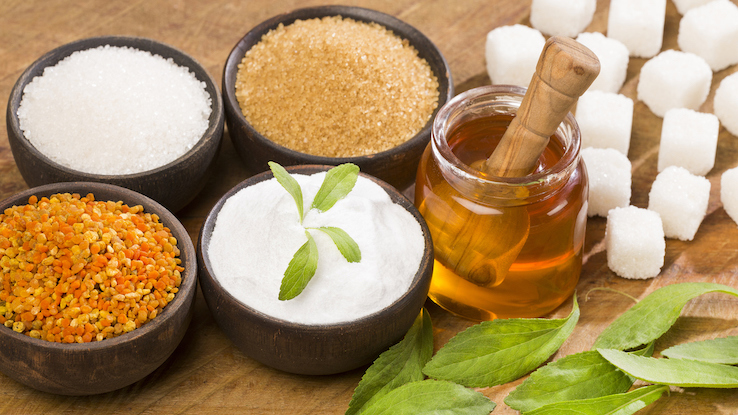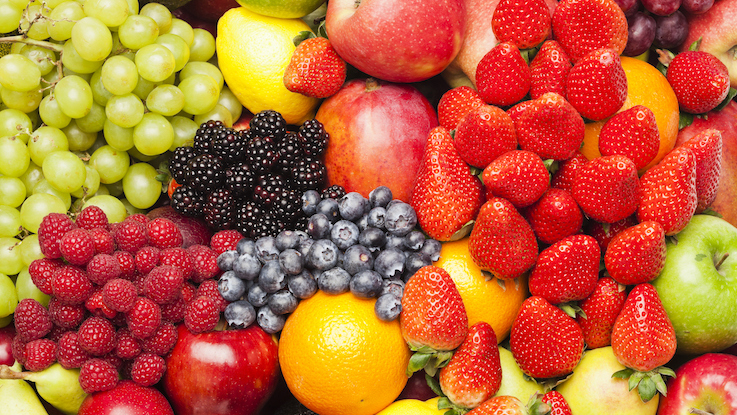
If you have a sweet tooth but you’re trying to avoid added sugars, you may be searching for a sugar alternative with fewer calories and more of the nutrients your body needs. So what’s the healthiest sugar substitute? Read on to learn the pros and cons of different options.
Why Is It Healthy to Cut Down on Added Sugars?
Ever wondered why people call sugar “empty calories”? That’s because refined table sugar has very few vitamins and minerals. So when you eat sugar, your body isn’t really getting anything out of it… except for the calories.
Added sugars are sweeteners with calories that companies put in processed foods or that you add at home. (That includes everything from corn syrup in candy bars to a spoonful of honey in your morning cup of tea.) Sugars are okay as an occasional treat. But if you eat them too often, you’re probably eating them instead of more nutritious foods. So, cutting down on sugary foods can help you get more of the nutrition you need while avoiding extra calories.
And health and nutrition experts say that over time, eating too much sugar can have many negative health effects. If you eat and drink a lot of added sugar, you may be at higher risk of:
- Weight gain
- Tooth decay
- Inflammation
- High blood sugar
- High blood pressure
- Skin problems, including acne and faster skin aging
- Serious conditions like type 2 diabetes, heart disease and certain cancers
It can be tricky to avoid added sugars completely because they’re in so many of the products on supermarket shelves. But you can cut back by being more mindful of what you eat — and choosing healthy alternatives to sugar.
Are Artificial or Natural Sweeteners the Healthiest Sugar Substitute?
These days there are many sugar alternatives and substitutes on the market — and the language can be a bit confusing.
For example, artificial sweeteners are highly processed synthetic sugar substitutes. They’re made in a lab, but they’re usually derived from naturally occurring substances in plants and herbs. On the other hand, so-called natural sweeteners like honey and agave syrup are often touted as the healthier alternative. But many of these go through at least some processing and refining as well — and they can actually be quite high in calories.
To try and make things simpler, we’re describing some common types of sugar substitutes and grouping them based on calorie content (zero, low and high). That way, you can make an informed decision about the best option for you.
Zero-Calorie Sugar Substitutes
Stevia is one popular zero-calorie sweetener. It’s a sugar substitute made from highly refined extracts from the stevia plant leaf. It has zero calories and can taste up to 400 times sweeter than sugar, so you can use very small amounts. And unlike table sugar, stevia won’t raise your blood sugar levels.
Monk fruit sweetener is another example of a zero-calorie sweetener. Monk fruit is a small melon-shaped fruit. This sweetener is made by crushing the monk fruit, extracting the juice and separating out the sweetest element of the juice (called mogroside). It has zero calories and can taste up to 200 times sweeter than sugar.
While these sound like healthy alternatives to sugar, research is still ongoing about their health benefits and potential side effects. There are still open questions about how they affect hunger, sugar cravings, metabolism and overall health. So it’s a good idea to only have zero-cal sweeteners in moderation.
Low-Calorie Sugar Substitutes
One common type of low-calorie sweetener is sugar alcohols, like erythritol and xylitol. These are carbohydrates that occur naturally in certain fruits and vegetables. While they don’t actually contain alcohol, they do have some calories — but the number of calories is much lower than regular sugar.
Xylitol has about half the calories of sugar (2.4 calories per gram) while erythritol has less than one calorie per gram. Both have about three quarters of the sweetness of sugar, so they’re still plenty sweet. One downside to sugar alcohols is that they may cause digestive issues. So they may not be the best choice if you have digestive problems like irritable bowel syndrome (IBS).
You can also find several other kinds of low-calories sweeteners:
- Aspartame (also known as Equal) has four calories per gram (similar to sugar). But it’s about 200 times sweeter, so you only need a tiny amount to sweeten foods and drinks.
- Yacon syrup has about a third of the calories of sugar (1.33 per gram).
- Allulose has one tenth of the calories of sugar (0.3 per gram).
High-Calorie Sugar Substitutes
Sugar substitutes like raw honey, maple syrup and molasses can provide more nutritional benefits than table sugar. They each contain antioxidants, prebiotics, vitamins and minerals. But these products are all still added sugars and are still quite high in calories. So while these may be a slightly healthier alternative to regular table sugar, having too much of any of these sweeteners can still have negative health effects.
There are a number of other products on the market made from plant and fruit extracts that are often touted as healthier alternatives to sugar. However, many of these products also contain almost as many calories as table sugar. For example:
- Agave nectar is a syrup made from the blue agave plant. It has the same number of calories as table sugar. Because it tastes very sweet, you may not need to use quite as much (that’s why it’s used as a sugar substitute). But it doesn’t provide the same level of extra nutrients as raw honey or maple syrup, because it’s more highly processed. So it’s a high-calorie, low-nutrient sugar alternative.
- Coconut nectar sugar is a sugar made from coconut palm sap. It also has a similar number of calories to table sugar. The upside of coconut sugar is that it goes through very little processing so it retains some of the natural vitamins, minerals, fiber and antioxidants of the coconut plant. But it’s not very high in these nutrients, so any benefits are likely outweighed by the sugar and calories.
For the Healthiest Sugar Substitute, Try Sweetening with Whole Fruits

Overall, whole fruits are probably the healthiest sugar substitute for sweetening foods and drinks.
Fruit is nature’s candy, but with added benefits. Fruit has a type of natural sugar called fructose. But unlike added sugars, whole fruit also provides healthy fiber and a range of essential vitamins and nutrients.
And fruits can make a great alternative to some key sources of added sugar. For example, sugary drinks like soda are a main source of added sugars in the American diet. For a healthy swap, try adding fresh fruit to sparkling water instead. Oranges, lemons and berries all make great additions to sparkling water.
If you’re looking for a fruit-based sugar substitute when baking, fruit purees like apple sauce or mashed banana are a good choice. Dried fruits like raisins and dates also work well in baking. Just be aware of portion sizes, as dried fruits can often contain higher concentrations of sugar.
If you’re really aiming to lower sugar from all sources, you can also avoid fruits that are higher in sugar (like mango and grapes) and choose fruits that are lower in sugar (like raspberries, kiwi and grapefruit).
Resource Links:
- “Additional Information about High-Intensity Sweeteners Permitted for Use in Food in the United States” via Food and Drug Administration
- “Sugar Substitutes” via Family Doctor (American Academy of Family Physicians)
- “Artificial Sweeteners and Other Sugar Substitutes” via Mayo Clinic
- “The 5 Best (and Worst) Sweeteners You Can Eat” via Cleveland Clinic
- “What You Should Know About Sugar Alcohols” via Cleveland Clinic
- “Is Monk Fruit a Healthy Sweetener?” via Cleveland Clinic





